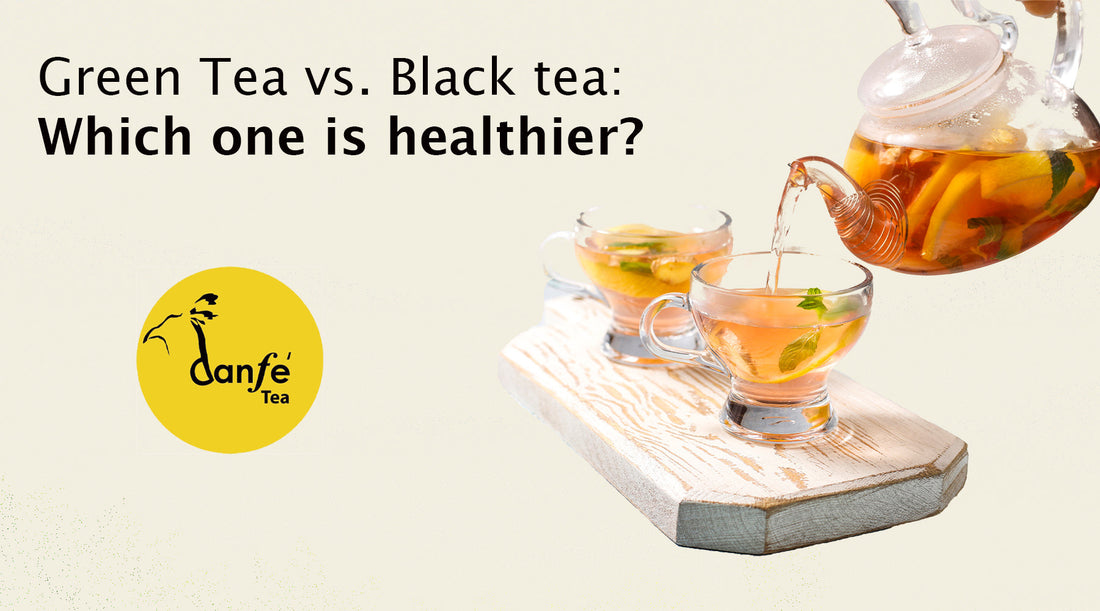
Green Tea vs Black tea: Health Benefits and Differences
Tea isn’t just a drink—it’s a daily ritual, a cultural staple, and (for many of us) a life-saving 8 a.m. survival tactic. Whether you prefer the bold richness of black tea or the light, clean taste of green tea, both varieties have deep roots and even deeper benefits.
They may come from the same plant—Camellia sinensis—but the difference lies in how the leaves are processed. And those little changes? They make a big impact on taste, color, caffeine levels, and even your health.
Wondering which tea is right for you? Let’s break it down leaf by leaf.
What is Green Tea?
Green tea is the minimalist in the tea world—clean, fresh, and a little bit zen. It’s gently processed to retain its natural antioxidants, giving it a pale green hue and a subtle, grassy flavor.
How Green Tea is Made
- Plucking – Only the youngest leaves are harvested.
- Withering – Leaves are allowed to soften naturally.
- Steaming or Pan-Firing – This halts oxidation, keeping the leaves green.
- Rolling & Drying – Locks in the flavor and aroma.
Flavor Profile: Light, refreshing, sometimes sweet
Brew Color: Pale yellow to soft green
What is Black Tea?
Black tea is green tea’s bolder, moodier sibling—fully oxidized and full of flavor. It’s the go-to for those who need a real kick in the morning (without the side-eye from their espresso machine).
How Black Tea is Made
- Withering – Moisture is reduced to prep for oxidation.
- Rolling – Leaves are twisted to release natural oils.
- Oxidation – This is where the magic happens. The leaves darken and flavors deepen.
- Drying & Sorting – Final processing brings out rich malty or smoky notes.
Flavor Profile: Bold, malty, sometimes fruity
Brew Color: Amber to reddish-brown
Key Differences: Black Tea vs Green Tea
|
Feature |
Green Tea |
Black Tea |
|
Processing |
Unoxidized |
Fully oxidized |
|
Flavor |
Light, grassy |
Bold, malty |
|
Caffeine |
20–50 mg/cup |
64–112 mg/cup |
|
Brewed Color |
Pale yellow to green |
Amber to reddish-brown |
|
Antioxidants |
EGCG, catechins |
Theaflavins, thearubigins |
Health Benefits of Green Tea
People have been reaping the health benefits of green tea for centuries. Research suggests that drinking green tea regularly can improve overall well-being in several ways:
-
Boosts Brainpower Without the Buzz
Thanks to L-theanine and moderate caffeine, you stay sharp—without the jittery crash. -
Supports metabolism and fat control
EGCG (epigallocatechin gallate) is your metabolic sidekick.
-
Radiant Skin: Polyphenols promote elasticity and reduce inflammation
-
-
Heart Health Hero
Green tea may help reduce LDL cholesterol and improve circulation. -
Fights Bad Breath
Catechins battle bacteria—mint gum, meet your leafy rival.
-
Heart Health Hero
Health Benefits of Black Tea
-
Morning Mojo
With its higher caffeine content, black tea is your new AM MVP.Weight Management
Polyphenols in black tea help reduce belly fat and support digestion. -
Kind to Your Kidneys
Black tea has low oxalate levels, making it easier on your system. -
Mood Stabilizer
Its antioxidants can help regulate cortisol, your stress hormone. -
Hair Goals
Antioxidants may strengthen strands and reduce hair fall.
Which Tea Should You Choose?
Your ideal tea depends on your health goals, taste preferences, and caffeine tolerance:
Choose Green Tea If:
- You prefer a lighter, vegetal taste
- You want to feel calm yet focused
- You're targeting skin, heart, or weight goals
Choose Black Tea If:
- You love a stronger and richer brew
- You need a morning pick me up.
- You're looking for a kidney support or stress relief.
Ultimately, both teas are winners in their own way. There's no wrong choice—just the right fit for you.
Sip the Himalayas with Danfe Tea
At Danfe Tea, we do more than source tea—we share tradition. Our Nepalese loose-leaf teas come from the pristine gardens of the Himalayas, offering rich flavor and heritage in every cup.
🌿 Try our bold Ilam black teas, available in 2.5–3.5 oz or 1 lb sizes. Prefer variety? Subscribe monthly and explore a new taste of Nepal with every shipment.
Buy the Finest Loose-Leaf Teas from the Himalayas
Experience handcrafted teas that tell a story. Our teas are:
- Sustainably grown
- Handpicked and traditionally processed
- Packed with flavor and wellness benefits
Danfe Tea brings you the finest loose-leaf teas in the Himalayas. With robust flavors and many health benefits, we invite you to try our high-quality black teas. These teas are available in 2.5-3.5 oz or 1 lb variants. We also offer monthly subscriptions to these products.

FAQ
1. What are the main differences between black and green tea leaves?
The primary difference lies in the processing. Black tea leaves undergo complete oxidation, giving them a dark color and richer flavor, while green tea leaves are not oxidized, retaining a lighter color and more delicate taste.
2. Can drinking green tea improve heart health?
Yes, green tea is known for its antioxidant properties, which can help reduce the risk of heart disease by improving cholesterol levels and blood flow.
3. How does the caffeine content in black tea compare to green tea?
Black tea generally contains more caffeine, ranging from 64-112 mg per cup, compared to green tea's 20-50 mg. This makes black tea more suitable for those seeking a stronger energy boost.
4. Is it true that green and black tea can aid in weight loss?
Indeed, both green and black teas have compounds that can help with weight management, although through different mechanisms. However, the fat loss effect is not proportional to the amount of tea consumed and the recommended amount is 1-2 cups of tea daily.
5. Which type of tea is better for stress relief and why?
Both teas offer stress-relieving properties due to their antioxidant content. However, the L-theanine in green tea has a more pronounced effect on reducing anxiety and promoting relaxation. People also enjoy tea with the sunrise, to experience a pleasant start to their day.










